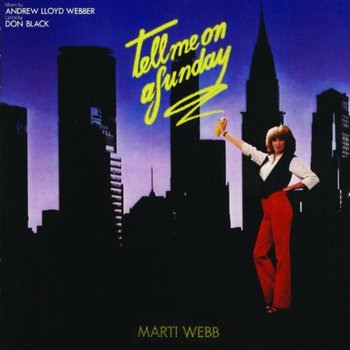
This show was later transferred to Broadway with Bernadette Peters as the girl and Christopher d'Amboise in Wayne Sleep's role. Reviews praised Peters for her phenomenal performance, for which she subsequently won the Tony for Best Actress, but did not consider this enough to redeem the poor characterisation. Since then, the show has mostly been performed under the original title as a modernized one-act show, most notably with Denise Van Outen, who recorded a new cast album to go with it in 2003.
This show contains examples of:
- Absence Makes the Heart Go Yonder: The song "Come Back With the Same Look In Your Eyes" is about the girl telling her boyfriend that she fears he might have an affair while he's away on business.
- Ambiguously Jewish: The girl's second love interest, a film producer named Sheldon Bloom. In the song named after him, the girl proclaims that she'll give up pork for him. The book Andrew Lloyd Webber: His Life and Works quotes lyricist Don Black as saying that the Sheldon Bloom character is indeed meant to be Jewish, but it is never mentioned directly in the song cycle itself.
- Break-Up/Make-Up Scenario: When this is staged as the two-act Song & Dance, the girl returns at the end of the second act and is reunited with one of the men she broke up with previously (portrayed by the main male dancer).
- Break-Up Song: There are several, with the most famous being the title song, "Tell Me on a Sunday"
- Broken Bird: The Broadway version has Emma become this once the man she loves most, Joe, leaves her. On the rebound, she has an affair with a married man named Paul, only to realise that she is using him when he arrives at her apartment late one night, having left his wife for her. After he goes, she becomes determined to be her true good self again."A love really hurt me. I hurt someone back..."
- The Cover Changes the Meaning: In the 2003 production, I'm Very You, You're Very Me goes from being a song about dissatisfaction in a seemingly perfect relationship to a song about being overjoyed at the prospect of becoming a (step)mum.
- The Ghost: Every character except for the heroine. In some productions, photos representing the men she dates may be displayed, but they never appear onstage.
- Heel Realization: Emma has one at the end of the Broadway version of Song & Dance. The married man she's been having an affair with appears at her door, saying he's left his wife for her. Ashamedly admitting she was only using him, Emma sends the man away and vows she will change.
- The Mistress: The girl, desperate and discouraged by several failed relationships, becomes one toward the end. Then when the man knocks on her door one night and tells her he's left his wife for her, she's forced to admit she wasn't serious about the relationship and was only using him.
- No Name Given: The heroine doesn't have a name or any particular career aspirations, save for the Broadway production, where she is named Emma, and is an art school graduate who hopes to become a successful milliner.
- Satellite Love Interest: The Girl, despite being the protagonist. We know next to nothing about her, and most of her songs revolve around her love interests.
- Single Woman Seeks Good Man: This drives the plot.
- Sounding It Out: Throughout the musical, the girl writes letters home to her mother, and sings them aloud while doing so.
- Sung-Through Musical
- What Have I Become?: In the final scene of the Broadway version, Emma asks herself this when she realises she used a married man named Paul just like men previously had been using her. He was willing to leave his wife for her, but he didn't mean anything to her. Emma vows that she will change and become the good person she once was again.
- Wide-Eyed Idealist: Emma in the Broadway version starts off this way, excited to learn about America, and longing to fit in as a true New Yorker. After several failed relationships, though, she becomes jaded. When she realises what's happened to her, she resolves to go back to being the person she used to be."Take that look off your face. You were better naive."
